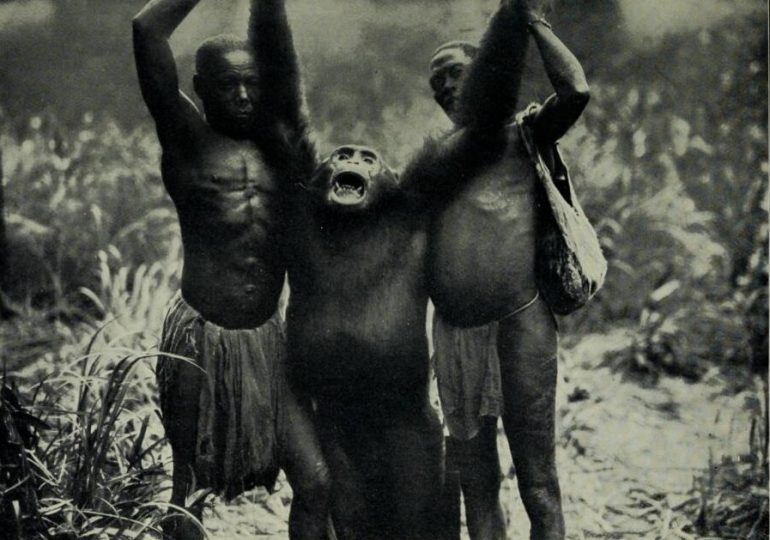THE chilling legend of the Bondo Ape has plagued researchers for decades with Congo’s Bigfoot still a mystery.
Terrifying tales describe the giant primates as a hybrid of a gorilla and human – capable of slaughtering lions and wrecking havoc in the jungle.
Wikimedia CommonsLocals in Congo have told tales of the mysterious Bondo Ape who lives deep within the jungle[/caption]
Wikimedia CommonsThe giant primates are said to be friendly with humans but fearless predators with them even taking on lions[/caption]
Through miles of crocodile-infested waters and rough terrain in the Democratic Republic of Congo (DRC) researchers first found the Bondo Ape 20 years ago.
Known as Bili-Uéré chimpanzees due to the region of the DCR they live in, tens of thousands of the wild species are said to be among the trees.
Chimps are known for their aggressive outbursts but the Bondo Ape is said to be a far more ruthless and calculated species.
One of the researchers who first discovered the apes in 2004 claims to have witnessed one devouring a leopard’s fresh carcass.
With locals constantly warning people that the Bondo beasts are the true kings of the jungle after a number of stories describe them as formidable lion killers.
The almost mythical rumours around the fearless ape are said to have been passed down through generations of indigenous tribes before filtering into local communities in the DCR.
These terrifying stories have even earned them the nickname of “the yeti in the forest”.
The creatures are still relatively unknown to researchers with only a handful of people ever coming face to face with a Bondo species.
Those describe the apes as being taller than the average human (5ft 5in) by a few inches with most explorers documenting them as around 5ft 7in.
They have flat faces and a wide mouth consistent with chimps.
Another similarity is their likeliness to humans in their hands, feet and ears as well as how they often walk upright.
Another chilling theory the locals believe is that the apes howl at the moon after dark.
Karl Ammann, a Swiss photographer, was one of the first people to go on the hunt for the Bondo Ape in 1996.
He reportedly saw the skull of a primate in a Belgium museum which was far from any ordinary chimps.
Prompting Karl to launch an expedition into finding which species was the rightful owner of the skull.
One visit to northern Congo saw him speak to the locals by the Congo Basin who revealed the bones were a common find in the area.
Hunters described to Karl how shadowy predators would be seen stealing kills off them through brute displays of strength.
Earning the apes the nickname of the “lion killers”.
Despite this they are said to be relatively friendly towards humans.
Explorers and locals have told stories of how the species tend to be more curious than concerned when spotted.
Although some claims dispute this with others saying adult Bondo Apes seem on edge around humans and quickly try to disappear from sight.
They were coming in for the kill – but as soon as they saw my face they stopped and disappeared
Shelly Williams
Shelly Williams, one of the brave researchers who has seen a wild Bondo Ape up close, retells one occasion where she feared for her life.
She said: “We could hear them in the trees, about 10m (33 ft) away, and four suddenly came rushing through the bush towards me.
“If this had been a mock charge they would have been screaming to intimidate us. These guys were quiet, and they were huge.
“They were coming in for the kill – but as soon as they saw my face they stopped and disappeared.”
Another shocking revelation from the locals revealed that the Bondo species was said to be immune to their weapons – most notably poisoned arrows.
After days of searching the jungle area, Karl claims to have stumbled upon another unique skull said to be a mix of a chimp and a gorilla.
Moments later, a whopping patch of ape excrement was found next to a huge footprint.
It was said to have resembled a gorilla’s feet in shape but far bigger in size.
These chimpanzees may have turned the tables on leopards. This may explain why in this population, the apes appear to be unafraid of nesting on the ground
Research team
Another huge difference in the Bondo Apes and all other chimps is how they are said to sleep on the ground rather than nesting in trees.
The research paper from the historic 2004 hunt for the great apes found that they often find it more comfortable to sleep on the ground rather than curled up in the trees.
The team wrote: “They are very skilful at weaving saplings and
other plants into an intricate structure to make a comfy bed for the night.
“This seems to be a strange choice, as sleeping on the ground may make them more vulnerable to leopards and other leopards.
“These chimpanzees may have turned the tables on leopards. This may explain why in this population, the apes appear to be unafraid of nesting on the ground.”
Following a 20-hour search for the mysterious primates, a team of explorers found the Bondo Ape was closely related to a normal chimp species.
DNA testing through the primate’s leftover excrement found they were actually eastern chimpanzees.
With many even saying the Bondo was simply an interesting variation of the well-known species rather than some mythical new creature.
What is Bigfoot?
THE mystery of Bigfoot has been causing a stir for hundreds of years.
The mythical beast is thought to stand eight to ten feet tall and weigh more than 35 stone, with it having feet twice the size of average humans and 17 inch footprints.
One of the first discoveries of Bigfoot was back in 1811 when British explorer David Thompson found large footprints that have been attributed to the creature.
There have been several tales of mythical giant ape-like humans since lurking in North America, particularly the mountainous Western region.
The stories revolve around giant hairy men stalking the woods and occasionally scaring hikers, campers, and lumberjacks.
Some have described characteristics of the creatures as being shy and nocturnal.
Bigfoot is also known in different cultures around the world and is sometimes referred to as Sasquatch, Yowie Man, Yeti, or Witiko.
Many scientists debunk the story of Bigfoot, describing it as either a campfire story or a complete myth.
However, a few scientists boldly claim that there is forensic evidence to back the claims of the existence of something like Bigfoot.
Jeff Meldrum, a professor of anatomy and anthropology at Idaho State University in Pocatello, believes that there exists a mysterious creature yet to be discovered.
According to National Geographic, Jeff Meldrum stated: “Given the scientific evidence that I have examined, I’m convinced there’s a creature out there that is yet to be identified.”
ReutersDNA testing through the primate’s leftover excrement found they were actually eastern chimpanzees[/caption]
Leave a comment








